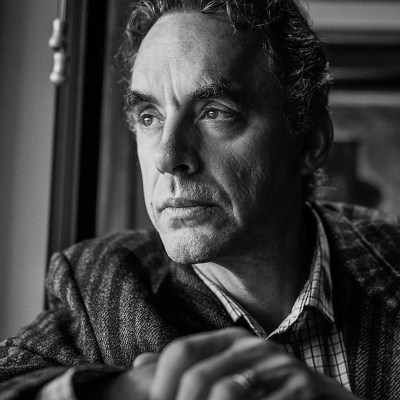7 Lessons in Evangelization from Jordan Peterson

LIFENEWS: Equal Rights Amendment That Could Overturn Every Pro-Life State Law Nationwide Ratified in Another State
June 1, 2018
Ben Shapiro: The Suicide of Europe
June 1, 2018By Sam Guzman, The Catholic Gentleman
 Recently, an unlikely thinker has exploded on the world stage. His name is Jordan Peterson. A Canadian clinical psychologist and professor, he is an unlikely candidate for a global intellectual superstar. Yet, his YouTube channel has over a million subscribers, his recent book has risen to a global bestseller, and his current lecture tour is selling out theaters and auditoriums around the world.
Recently, an unlikely thinker has exploded on the world stage. His name is Jordan Peterson. A Canadian clinical psychologist and professor, he is an unlikely candidate for a global intellectual superstar. Yet, his YouTube channel has over a million subscribers, his recent book has risen to a global bestseller, and his current lecture tour is selling out theaters and auditoriums around the world.
I have followed the Peterson phenomenon with great interest for several reasons. First, because Peterson is doing our post-modern, post-rational world a great service. He is ably and coherently defending our Western Christian heritage when so little are unwilling or unable to do so. Second, he’s courageously confronting the madness of irrational, post-modern identity politics with what can only be described an innovative approach combining psychology, natural science, symbol, and myth. And third, because he is incredibly effective. Countless young men, formerly rudderless nihilists and atheists, give testimony (often tearfully) to transformative experiences leading to faith and purpose while listening to his lectures.
Now, Jordan Peterson is by no means an orthodox Catholic, and as with any thinker old or new, he should not be read with an uncritical eye. Nevertheless, I believe his meteoric rise speaks to a deep need spiritually and intellectually in our culture that hitherto has been addressed inadequately. I believe anyone who desires to effectively bear witness to the faith can learn from Jordan Peterson’s approach. Here are seven lessons in evangelization that we can learn from his cultural rise.
1. Tell Stories
Jordan Peterson leads with stories, with narratives, and they are above all biblical narratives. Of course, he is a scientist, and all his claims drawn from these stories are backed up in great detail by scientific and psychological insights. But he never leads with neutral facts (as if there were such a thing). He tells stories because he knows that human beings see the world in a narrative format. We see reality as a forum for action, as he puts it, and not as a collection of neutral objects.
At one time, catechesis and formation in the Church were largely narrative in nature. Pictures of biblical stories lined the walls of our churches and cathedrals, and the lives and legends of the saints provided practical guidance on how to live for even the simplest peasants. But recently, our apologetics and catechesis have taken a intellectualized bent, focusing on rational arguments and logical proofs to the neglect of stories.
The problem is, our culture is burned out on mere rationalism. Strict rationality, severed from mystery and story, is the path to insanity. More than anything we are hungry for meaning and a story in which we can play apart. Young men today don’t want more syllogisms as much as they want a call to be actors in a grand, unfolding narrative. As Catholics, we should learn again the power of story, for it can compel and move hearts far more effectively than arguments alone (just ask Tolkien).
2. Teach Rules
For at least the past 60 years, the Church has engaged in a campaign to strip the rules of the faith to the bare minimum. Required fasting has been all but eliminated from Catholic life. Meatless Fridays have been declared optional for most of the year. Holy days of obligation that fall too close to the weekend are transferred to Sunday. The Eucharistic fast has been reduced to a paltry one hour. Other than survival in some stricter religious orders, Catholic asceticism has been nearly annihilated. No demands are made of us, and we are worse for it.
In a milieu where rules are abhorred, Jordan Peterson has written an international best-selling book called “12 Rules for Life.” Far from being impediments to freedom or happiness, Peterson argues that rules are necessary for human flourishing, and he offers 12 of his own distilled from life experience, psychological insights, and the wisdom of Western civilization. This book has sold at least a million copies internationally, and its popularity shows no sign of slowing down.
Rules are not wrong. To paraphrase Chesterton, the rules of the Church, dogmatic or merely practical, serve as walls of a playground. Yes, they can feel limiting at times, but they are really ordered towards our growth, development, and ultimate happiness. Instead of apologizing for and abolishing her rules, the Church should learn again to demand something of us. We might be surprised at the response.
3. Call People to Carry the Cross
Catholics are no stranger to the idea of suffering as a means of sanctification and salvation. Our saints, popes, and doctors write constantly about the redemptive power of suffering, the call to carry the cross, and the need to sacrifice for the salvation of the world. One of our most famous books is called The Imitation of Christ, which calls us to strive manfully for virtue by embracing “the royal way of the cross.”
Yet, the message of the cross is not popular in a secularized world, and many Catholics are embarrassed by this emphasis in Church teaching, toning it down or ignoring it altogether in a misguided attempt to win converts. Yet, paradoxically, toning down the call to carry the cross is exactly the wrong thing to do, and it always leads to an impotent faith.
The cross is central to Jordan Peterson’s worldview. He teaches frequently that life contains unavoidable suffering, and embracing this suffering courageously is the path to self-transcendence. Moreover, he believes the only faith worth anything is a faith that is lived. And strangely enough, his message is exactly what a world of coddled men and women (but especially men) need and want to hear. The Church should learn from this, renewing her call to conversion, penance, sacrifice, and suffering willingly born in union with Christ.
4. Choose Confrontation, not Accommodation
There was once a time when the Catholic Church was notorious for confronting the false ideologies of the world fearlessly. Popes contended vigorously with errant philosophies, heresies, and even political and economic systems. She was truly a Church militant.
Following the Second Vatican Council, however, all that changed, and the Church chose the path of accommodation instead of confrontation. She sought, wherever possible, to affirm and make peace with the world. And for the most part, her cultural influence was neutralized.
Jordan Peterson is not afraid of confrontation. A great deal of his rise to fame was due to his vociferous condemnation of Canada’s proposed laws that would impose new codes of speech friendly to radical transgender activists. Rather than capitulate, Peterson boldly said he would never comply with such insanity. And many rallied around him because of it.
If the Church once again began to confront the world, the flesh, and the devil, and declare the truth boldly, she would make many enemies. But she would also be a beacon of hope and light around which many hungry for truth and clear guidance would rally.
5. Use Symbols and Artistic Beauty to Communicate
One of Jordan Peterson’s more famous videos is called “Why You Need Art in Your Life” (a lecture famously watched by rapper Kanye West). An excerpt from his biblical lectures, the video powerfully communicates the necessity of beauty in incarnating transcendence. Moreover, nearly every lecture he gives includes an explanation of a symbol from a world religion, a piece of art, or a great piece of literature. Peterson recognizes that symbols, whether literary or visual, have a powerful ability to communicate truth.
Fortunately, Catholics have not ignored beauty entirely. Leaders in the Church like Bishop Robert Barron have frequently called for a renewal of creativity and beauty both as a means of evangelization and the sanctification of the faithful. Pope Benedict XVI also taught frequently on the power of beauty both liturgically and artistically.
Despite this profound teaching and a vast history of glorious art and architecture, far too many Catholic priests and laity seem to think that beauty is something superfluous. It’s nice, we think, but ultimately unnecessary. This is simply wrong. If we are ever to effectively evangelize our culture, we need to rediscover the power of beauty and begin once again to create it, for it is a reflection of the Divine.
6. Integrate science
As I mentioned earlier, Peterson leads with stories, but he also backs up his philosophical insights with compelling scientific evidence. He is a master at synthesizing transcendent truths with insights from psychology and the natural sciences, showing their intrinsic harmony.
While the Church is by no means opposed to science—and indeed historically has been one of the greatest sponsors of scientific research—far too often faith and science are segregated into two realms during the practical teaching of the faith. It seems there is a fear that if science is used too much in evangelization or catechesis, it will threaten the divinely revealed truths of the faith. But of course this is not true.
Rather than segregate the natural and the supernatural (which concedes ground to radical atheists who claims the Church is anti-science), the Church would do well to show how scientific insights from disciplines as varied as neuroscience or even physics confirm what the Church has taught all along. Doing so would be a compelling demonstration of the harmony between faith and reason.
7. Speak with Passion
In most talks on evangelization I have heard, the focus is usually on joy. And joy is indeed an important witness to the truth of the Gospel. But far too often, joy is associated with big smiles, boisterous laughter, and extroversion.
Interestingly, Jordan Peterson exhibits none of those traits. He has admittedly struggled with depression and physical health problems. He communicates with solemnity and gravity. Though he clearly speaks from a deep reservoir of emotion, he almost never smiles or laughs. Nevertheless, he is captivating and persuasive because he speaks with deep passion about his ideas. Listening to him, you can tell that he not only lives by what he says, but he would willingly suffer for the ideas he is communicating. In a world where intellectual cowardice reigns, and believing anything dogmatically is a sin, such confident zeal is a powerful sign of contradiction.
If we are to be effective evangelists, we must believe in what we say and communicate it with passion. Catholicism isn’t simply one idea among many—we must confidently believe in it to the point that we are willing to suffer and die for it if necessary. Martyr means witness, and the martyrs are the ultimate evangelists (they are the seed of the Church) because they witness to the reality of Christ with suffering and blood. We must have this kind of faith, and even if we are not called to lay down our lives for Christ, we must be willing to or our evangelism will ring hollow.
An Imperfect Witness
Jordan Peterson is not perfect, nor is he some sort of secular Messiah as some have portrayed him. Nonetheless, he is a powerful communicator ably defending our Western heritage and effectively challenging many to carry the cross, pursue virtue, and seek transcendent truth. His success is not random, but rather reveals a great hunger in the world for higher meaning and purpose. As Catholics, we can learn from his success, applying the lessons in our own cultural engagements.
https://www.catholicgentleman.net/2018/05/lessons-in-evangelization-jordan-peterson/
Related posts
April 26, 2024
April 26, 2024





